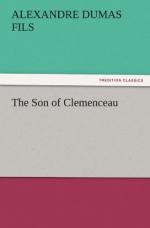But the conflict, whatever the major’s wariness, could not be long protracted, for canes of this sort are tiring to the arm, unlike smallswords; he was still on the defensive when the student assailed him with a shower of blows which taxed all his skill and nerve, and the strength of the staff which he had borrowed from his foe. Well may one suspect “the gifts of an enemy!” as the student might have cited: “Timeo danaos,” etc. At the very moment when the officer’s head was most in peril, while he guarded it with the staff held horizontally in both hands separated widely for the critical juncture, it ominously cracked at the reception of a vigorous blow—it parted as though a steel blade had severed it, and the unresisted cane came down on his skull with crushing force.
Out of the two cavities which the broken staff now presented, rattled several gold coins. At the sight, the old hag scrambled toward where the major had fallen senseless. The Jew, after picking up the broken pieces of wood, would have lingered to recover those of the precious metal though at cost of a scuffle with Baboushka. But his daughter rebuked him in their language with an indignant tone, which brought him to his senses in an instant. She seized him by the arm, and hurried him away at last.
After a brief survey of the defeated man, wavering between the fear that he had killed him and the prompting to see to his hurts, if the case were not fatal, the student took to flight in the direction the beautiful girl had chosen. He well knew that this was a grave matter, and that he trod on burning ground. At twenty paces farther, he remembered his cloak, but on the bridge were now clustered several shadows vying with Baboushka in picking up the coin before raising the unfortunate Von Sendlingen.
Not a light had appeared at the windows of the houses, not a window had opened for a night-capped head to be thurst forth, not a voice had echoed the Jewess’s call for the watch. It was not to be doubted that Footbridge street had allowed more murderous outrages to occur without anyone running the risk of catching a cold or a slash of a sabre.
“A cut-throat quarter, that is it,” remarked the student, still too excited to feel the cold and want of his outer garment. “After all, one cannot travel from Berlin to Paris without getting some soot on the cheek and a cinder or two in the eye. In the same way it is not possible to see life and go through this world without being smeared with a little blood or smut.”
While talking to himself, he smoothed his dress and curled his dark and fine moustache, projecting horizontally and not drooping. He had walked so fast that he had overtaken the Jews, delayed as the girl was by her father’s lameness, and having to carry the violin in its case which she had recovered and preciously guarded.
“What an audacious bully that was,” the student continued; “but even a good cat loses a mouse now and then.”




